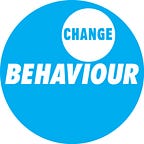Have we really been following the (behavioural) science?
This article was first published on LinkedIn 7th January 2021
If you were asked to select a discipline that had a particularly large amount to contribute to solving the world’s biggest problem right now, you might very well go for behavioural science.
After all, behind R rates, new variants and debates about the efficacy of masks sits a very simple and indisputable fact. Coronavirus is transmitted by human contact. How, where and indeed whether people interact is the driving force behind the virus — and it is by influencing these interactions that we can minimise the damage it causes.
What more perfect, or humbling, task could there be for those of us who spend our time trying to make the world a better place by changing people’s behaviour?
And yet, in the UK at least, perhaps the most notable contribution of the behavioural science community so far has been a heated argument about the existence of behavioural fatigue and whether this might be a factor in the waning impact of lockdowns.
I say ‘argument’, but as far as I can tell everyone is in violent agreement that behavioural fatigue is not a concept that exists in the academic literature — and therefore is entirely irrelevant.
Those of us with a more common sensical approach might question this conclusion. As lockdown 3.0 commences, a brief look at climbing infection rates suggests that, however much people deny this in surveys, public adherence to social distancing is indeed waning.
It’s easy for the debate to remain stubbornly at this level. We all enjoy a good rant about the flaws in government messaging and the confusion and lack of trust engendered by a series of communications mis-steps. But to keep discussing PR strategies and offering our views on the latest hands/face/space-type mnemonic does little to advance the behavioural science cause. And to imagine that the most decisive role we might play is to somehow rekindle a March-style enthusiasm for staying at home is also, in my opinion, a mistake.
Instead, as a grey 2021 dawns, has the time for more practical and targeted behaviour change solutions finally arrived? Can we at last focus on developing interventions that work rather than debating what has gone wrong so far?
Scanning for big, pressing challenges that particularly lend themselves to behavioural solutions, I’d suggest the following to start with:
· Improving public engagement with contact tracing
· Increasing compliance with isolation for those with symptoms or a positive test
· Working with staff in hospitals and care homes to minimise nosocomial infections
To make a genuine difference to the human behaviours at the centre of each of these, our experience at Behaviour Change suggests that we’d need to do three main things:
1. Use in-depth research to gain a real understanding of how people are behaving at the moment and crucially, why they are doing so
2. Identify behavioural tools that can either make it easier or put people under pressure to adopt the right behaviour
3. Rapidly test potential solutions at a small scale to see if they work, and scale up the ideas that do
This practical, action-orientated approach is what we need from behaviour change specialists right now. Let’s hope 2021 finally gives some of us the opportunity to put these real-world skills to work.
Originally published at https://www.linkedin.com.
